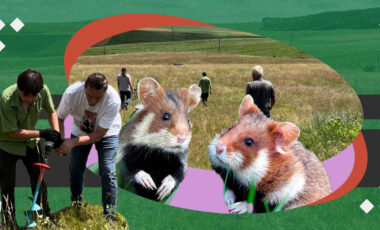How to solve the problem of homeless animals: the experience of one city
Volunteers of Sloviansk in the Donetsk region saved hundreds of dogs from slaughterers and are building a humane system in the city. Let's figure out how they managed it.

The situation with homeless animals in Ukraine has always been considered secondary. Only in recent years have some large cities begun to approach the issue of regulating the number of stray dogs and cats. It started primarily with the efforts of volunteers, and only then did the authorities join in dealing with the issue. One of the illustrative examples of how to save animals from destruction, and the city's inhabitants from bites, was the experience of Sloviansk.
Local volunteers raised the work of the communal quarantine site to a high level. However, there is still room for improvement here.
Stray animals are a global problem
The need to regulate the population of street animals is relevant for any city worldwide. The problem is minimized in more civilized countries, where this task is solved at the state level. In Ukraine, where volunteers mainly deal with this problem, its acuteness is going through the roof. According to the Washington Post, which researched 54 countries, Ukraine is among the top ten states with the most significant number of stray animals.
Good experience in Ukraine
The most successful budgetary project in this area is the Lviv communal enterprise Lev, created based on the former Soviet "utilization shop." In 2015, the enterprise began to develop after adequate management established interaction with volunteers. With the help of philanthropists, the city budget, and a grant from the European Commission, a major overhaul of the premises was made here, equipment was purchased, and the animals were provided with adequate living conditions. Since 2016, the company has opened an animal adaptation center and a communal veterinary clinic with modern equipment and a wide range of services, from various diagnostics to surgical operations. The proceeds are again directed to the targeted activities of LCE Lev, that is, the regulation of the number of homeless animals. In addition, the company implements several programs, one of which, Animal Rescue Service, is carried out in cooperation with the police.
How animals were saved from destruction in Sloviansk
Lviv's successful experience motivates volunteer animal protectors from other cities, even the most geographically remote ones. Among them is the Sloviansk in the Donetsk region. Until recently, the situation was utterly neglected there: homeless animals were simply killed here, and the quarantine site based on a motor transport utility company did not meet even the slightest requirements for keeping dogs. But worst of all, there were no prospects for development in this area, and the city authorities simply turned a blind eye to the problem. After the volunteers became more active in the city, the situation changed.
Irina Orlovskaya, a volunteer:
"It all started with the fact that we simply began regularly visiting the communal area for animal transfer and feeding the dogs kept there. And over the past two years, we have achieved that the city authorities began to allocate money for sterilization, says volunteer Irina Orlovskaya. "This is a big breakthrough because earlier trapping was carried out to dispose of animals. Now the money planned to be spent on paying the knackers is going to humane methods of population control. We are talking about 200,000 hryvnias a year, another 150,000 we manage to get for the second year thanks to the victory in the competition of the city program "Budget of Participation of Sloviansk." Although this amount, of course, is sorely lacking because the capture, vaccination, sterilization, and temporary housing of one animal costs about 1.5 thousand hryvnias.
How did the volunteers achieve such goals? According to Irina, this happened primarily due to publicity, bringing the problem to the public eye. They used everything they could — posts on social networks, ordinary conversations with people, and social polls on the streets.
"Publicity is the very first step. Then there will be benefactors, and the authorities themselves will start looking for how to solve the problem," says Irina.
Another volunteer Elena Boyko says:
– Previously, when the financing of the quarantine site passed through the housing and communal services department, for 40 dogs kept here, only a bag of cereal was bought per month. Some products were delivered to pets from compassionate employees of the enterprise, – volunteer Elena Boyko continues the description of the realities. "Now, about 150 dogs are kept here, and they are fed thanks to our collected charitable donations. Now, we spend about 2,500 hryvnias a week on food and additional payment to an employee of the KATP. These are purely charitable donations.
At the same time, Elena adds that it would be nice if the city authorities, in addition to allocating money for sterilization, considered the possibility of expanding the staff at the communal site because volunteers, each having their own job, cannot always devote the necessary time to animals especially when there are so many of them.
The main thing is to choose the right strategy
Analyzing the current situation, the volunteers of Sloviansk admit that the format of long-term keeping of dogs does not solve strategic problems. Therefore, they call the following scheme optimal: trapping, vaccination, treatment (if necessary), sterilization, and chipping, after which the animals are released back into their habitat. In principle, such a set of measures is considered normal in European countries, except that it includes mandatory animal registration and work to find new owners for them. The shelter should keep only old, sick, and injured dogs and cats.
About the license for a pet, taxes for it, and the unconditional admission to the animal of veterinarians and specialized inspectors who check the conditions of keeping, as applied to Ukrainian realities, is hard to speak. This level can only be reached if there is a clear state policy aimed both at regulating the number of animals and educating citizens on a responsible attitude to this topic. Plus, an effective control system. Moreover, in a number of countries, to get a pet, you need to pass a particular test, and not every person will be given a dog or cat from a shelter. There are no such norms in Ukraine, for good or bad, and almost anyone can take a pet. True, the number of people who want to do this is significantly inferior to the number of animals requiring shelter. Unfortunately, Ukrainian legislation does not allow building a clear structure for regulating stray animals or even responding if negligent owners throw their pets on the street.
"Unfortunately, domestic legislation that regulates work with homeless animals is not perfect," states the chief ecologist of Sloviansk, Larysa Solovey. There are no rights or obligations. The bodies of local self-government that should deal with this issue have not been determined — everything is left to the discretion of local authorities. In our city, this issue was first dealt with by the housing and communal administration, now environmental structures. I believe that creating an effective model for working with homeless animals should begin with revising the legislation.
However, until the authorities and legislators truly understand the problem's essence, we can help a homeless or lost animal.
🐶📝 To do this, just follow the steps below:
1. Make reposts on social networks.
On social networks, thematic groups post about the accommodation of animals. Repost and tell your friends about little brothers looking for a house or just living on the street. Suddenly, among your friends, some may have long dreamed of having a pet.
2. Find allies and join forces
In such a noble cause as caring for animals, there will always be those who will help you. Volunteering colleagues can be found both on social networks and in your life. Together you can always do more.
3. Become a pet curator
A curator is someone who takes responsibility for an animal found on the street. There are two types of supervision. The first is the coordination of the process, the search for a temporary or permanent home, and the organization of treatment, vaccinations, and sterilization. The second is financial assistance in the purchase of medicines, food, overexposure, or advertising. Just contact the shelter (if you already have one in your city) and choose the pet you would like to help. When becoming a curator, it is essential to remember that a bit of help is better, but on an ongoing basis.
4. Seek contact with more developed volunteer organizations
In any business, development is essential. In order to have a greater impact on the problem of homeless animals than just feeding them and finding their owners, a quarantine site is needed. For advice, find those who have more experience in organizing such sites. These can be veterinary associations, such as Doctors Without Borders, or successful public utilities, such as the LKP Lev. Volunteers with experience from large cities will always share how they overcame organizational difficulties.
5. Cooperation with city authorities
Sooner or later, you will have to establish contact with the city authorities. The cooperation of volunteers and city authorities is an ideal solution to the issue of homeless animals on city streets. Any charitable assistance is usually temporary, and it will be difficult for you to support animals for charitable contributions endlessly. On the other hand, taking care of street animals and citizens is the direct responsibility of the mayor's office. Now the issue of animals on the streets is handled by the department of ecology in any city council. That's where you need to go, sit down at the negotiating table and jointly develop a further concept of your activities.
The development and adjustment of legislative acts is a protracted process, as you know. Nevertheless, there is a tool that the local authorities can use even under today's laws, namely, an information campaign to raise the level of public culture in matters of the treatment of animals. After all, a large percentage of animals replenish the army of the homeless precisely because of the ignorance of the urban population on this topic. And even a humane person, seeing a "lost" dog on the street, may not guess to look for information about the owners on the collar. And having taken an animal home temporarily, not everyone will figure out how to find a new family for him through paper and digital ads. Or what services and organizations deal with this topic in the city and what assistance they can provide. Not to mention the promotion of certain moral values. Such an educational program, of course, will also require costs, which are unlikely to be found in the city budget of Sloviansk because the priority for financing here, as in other cities, remains the problems of the social and communal sphere. But this is where volunteers with experience in receiving grants under international programs can help.
For its part, the city government must also not only declare intentions but also show results. Now, as officials assure, Sloviansk is waiting for the funds from the regional environmental fund to construct a communal sterilization point designed for the temporary maintenance of 25 dogs.
Сounting chickens before they hatch is an ungrateful business. Still, even if we assume that the problem of stray animals in Sloviansk will be solved by the combined efforts of volunteers and officials in a few years, the victory will still be only local because the issue remains unresolved on a national scale. So the legislation still needs to be changed.

































































